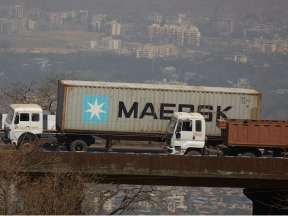Commenting on the balance between people and job reduction due to technology, Satish Lakkaraju, Chief Commercial Officer, Agility Global Integrated Logistics emphasis, “There are two aspects to it; with technology coming in, scale goes up. It means there is a fear that if technology comes in then we will be losing jobs, but scale matters in every organisation to continue having people. However, if people don’t upgrade their scale or their skills they will be out of business equally; one can have empathy towards people but at the same length and breadth if we keep telling them to upgrade their skills and they don’t listen to it then ultimately they will be out of jobs not only with the current organisation but wherever they go, they will not be able to cope up with the demand that is required.”
Read More »Indian exports show V shaped recovery while imports remain subdued: Maersk Shipping
According to the Maersk India Trade update report, the Indian containerised trade drops by 30 per cent in the second quarter of 2020 as compared to the same period last year. However, as economies around the world start opening, India’s exports gain momentum and show signs of a V-shaped recovery. Exports out of India were down by over 24 per cent while imports suffered a greater shock with a fall of almost 34 per cent. V shaped recovery of exports Despite the overall drop in exports from India, commodities such as plastic & rubber have been in great demand and their exports, especially to China have seen a tremendous growth, up by 70 per cent, during Q2 of 2020. The plastic industry has a huge potential with the growth of end-user industries such as packaging, textile fibre and electronics. At the same time, tyre industry is one of the rare sectors which have not seen as much contraction as the others, giving a boost to the rubber exports. Vegetable exports have also seen a rise, especially to markets in the Middle East. Vegetable exports to the UAE have more than doubled in the said period as compared to 2019. The agricultural sector is expected to grow by 3 per cent in 2020-21 while exports are expected to grow between four to six per cent with minimal impact of COVID-19 pandemic. Major contribution to the growth in agricultural produce can be attributed to increase in rice sowing which has been up by almost 20 per cent than last year. The Indian Government is focussing on transport and warehousing infrastructure in order to encourage agricultural produce and this will help in boosting …
Read More »Blue Dart Express announces price increase of 9.6% effective January 1, 2021
Blue Dart Express has announced its General Price Increase (GPI), effective January 1, 2021. The average shipment price increase will be 9.6 per cent as compared to 2020, dependant on the shipping profile. Customers signing up from October 1 to December 31, 2020 will not be impacted by the price increase. Balfour Manuel, Managing Director, Blue Dart, said, “Embodying our role as the trade facilitator to the nation, our teams worked every single day through the pandemic, ensuring that the mission critical supply chain remained functional. As we adapt to the new normal, Blue Dart is taking every necessary step to consistently improve and enhance customer experience. The General Price Increase will account for the cost we have incurred and invested in our infrastructure and technology to provide our customers with the BEST experience. We intend on further enhancing our capabilities and especially in light of the pandemic, providing more sustainable solutions to our customers by utilising the power of technology and digitization for first, middle and last mile deliveries.” Ketan Kulkarni, CMO & Head – Business Development, Blue Dart adds, “Blue Dart, being the leader in the express logistics industry, has made strategic investments ahead of the curve to remain agile and adaptive in a dynamic environment. These include expanding our reach, improving transit times, network optimisation, infrastructure and technology solutions and focusing on emerging markets, SMEs and key sectors”. The company adjusts its prices annually, taking into account inflation, currency dynamics, fuel cost fluctuations and other rising regulatory and mandatory costs, such as expenses related to compliance for the workforce with enhanced security regulations across the large number of locations it services.
Read More »GEODIS establishes Asia-Europe corridor; commits long term airfreight capacity
GEODIS has confirmed a two-way schedule of flights from China to Europe and back, through to early 2021, as part of its AirDirect service. The company originally instigated its full aircraft charter arrangements on this route in March with ad hoc flights and introduced a weekly timetable in June to meet the urgent need for air cargo capacity which had diminished due to the effects of the pandemic. Now, with both freighter and passenger belly-hold space still in short supply, the logistics provider has announced a permanent schedule reaching into next year. Weekly direct flights will depart from Shanghai (PVG) every Monday and from Amsterdam (AMS) each Sunday to service what is expected to be a post-COVID resurgence in demand during what is traditionally a fourth quarter peak season. The advent of the China-Europe-China service brings the company’s total investment in GEODIS’ OCN to over €70 million. More than 400 flights have been successfully completed across Asia, Europe, North and Latin America to date. Among the customers requiring such a service are, in particular, a European auto manufacturer equipping its plant in China with sub-assembly parts. In addition, Lenovo, a global leader in the manufacturing of personal computers, smartphones, workstations, computer servers and smart IoT devices, is one of GEODIS’ customers of its AirDirect Mexico service (Hong Kong/ Guadalajara) as well as its weekly direct flights from Shanghai-Amsterdam. GEODIS ensures the transportation of Lenovo’s products are safely and securely handled, helping Lenovo to deliver its components to factories and finished goods to customers in a timely manner. “It is vital for our customers in China to be not only assured of regular capacity but also that their freight partner is …
Read More »We have come a long way from godowns to warehouse: Amit Malakar
Explaining why technology cannot be disruptive for the industry, Amit Malakar, Chief Customer Officer, Welspun One, shares, “With disruptive technology coming in the picture, we have come a long way from godowns to warehouse with cubic capacity. The next level of disruption probably came in where the goods started coming to us and we did not need to go to pick the goods with the help of Automated Storage & Retrieval System (ASRS). The next level is now we could manage everything sitting at home with few people at the site but technology is helping us to manage lot of things remotely. With technology we are able to do things much more efficiently.”
Read More »Logistics industry will be on a normal growth trajectory by the end of FY21: Vikash Khatri
Vikash Khatri, Founder, Aviral Consulting is of the opinion that by the end of FY 21 the logistics industry will be on a normal growth trajectory with a lag of one year. Explaining how, he continues, “We are approaching towards mid of FY 21 and the situation is still not normal. Although most of the economic activities have started inspite of the growth in COVID-19 cases but a normal situation is still far-off. Our estimate about transportation sector is aligned with ICRA’s estimate of contraction by 18-20 per cent. If we break down volume trends in month over month, we find that April was a completely washed out month, while transportation activities in May were about 45-50 per cent normal. Since June there is continuous improvement in month over month volumes and it is currently hovering around 80 per cent of normal volume. In last five months, decline in EXIM has also directly impacted hinterland transportation volumes. Once we extrapolate these volumes for FY 2021 with continued improvement in subsequent months, we see overall contraction in road transportation to the tune of 20 per cent.”
Read More »Saudia Cargo ramps up its capacity with the addition of Boeing 747F to its fleet
In order to enhance the logistic capacity of its fleet, Saudia Cargo has added a Boeing 747-400F freighter to help meet the significant surge on the demand for medicine, medical and preventive equipment and other similar goods. Bringing the total number to seven aircraft, the new freighter will boost the cargo and supply operations. Omar Hariri, CEO, Saudia Cargo, said, “We have taken practical steps to guarantee the cargo and supply operations smooth continuity to and from the Kingdom ever since the flights, excluding cargo and evacuation, were suspended due to COVID-19. Today, flights have been resumed but to a certain degree. Once the new freighter has been put into operation, it will increase the operation and cargo capacity and help the company meet its targets and provide logistic support to deliver urgent medical cargos to the Kingdom in order to mitigate the impact of COVID-19 as part of its continued efforts.” The aircraft started the freighter services in September after all licenses have been obtained, flight schedules have been prepared and proper enhancements have been put in place.
Read More »Shipsy launches ‘network module’ for Indian MSMEs/SMEs; on-boarded over 5000 exporters
Shipsy has announced to extend its platform for free of cost to the SMEs/MSMEs in India under its ‘Network Module’. The platform will provide SMEs/MSMEs access to utilities to connect with the verified agents and get access to competitive rates as well as much better service levels due to these vendors being verified by Shipsy. The platform offers a bouquet of services like price procurement, documentations handling and container tracking to improve on-time delivery of goods. Soham Chokshi, Co-Founder & CEO at Shipsy, said, “The MSME/SME segment has perhaps been the hardest hit segment in COVID-19, and the segment is in a desperate need to expand their business by going international. With a vision and aim to scale up Indian MSMEs/SMEs and give a boost to Atmanirbhar Bharat, we have launched ‘Network Module’ for MSMEs/SMEs to help the sector navigate through the challenges of exporting goods and most importantly help them become cost competitive in the global arena by reducing their freight costs. We have on-boarded more than 5000 small enterprises for this. We aim to expand the offering to Pan India and plan to cover more than 20,000 enterprises by the end of this fiscal. Our offering is aligned with ‘Atmanirbhar Bharat’ and ‘Make in India’ initiatives and it will enable the sector for long term sustainability, profitability and will address the needs of the SMEs/MSMEs. There are around 36 million SMEs operating in the country, generating 80 million employment opportunities and contributing 8 per cent to India’s GDP. We are currently processing 1.5 million transactions through our platform on daily basis and processes over 10 per cent of India’s total containerised export and import volume.” Last year Shipsy …
Read More »COVID-19 accelerates industry digitalisation to years: DHL Logistics Trend Radar Report
In the fifth edition of the Logistics Trend Radar, DHL has revealed 29 key trends that will impact the logistics industry over the next years. The fifth-edition of Logistics Trend Radar indicates that we are experiencing an overall stabilisation of trends from the past four years. However, with the logistics industry weathering the current global pandemic, transformation processes have been accelerated. COVID-19 has driven changes regarding recent logistics innovation, automation, and digital work more rapidly and has accelerated industry digitalisation by years. Conversely, many trends initially perceived as disruptive game-changers for the logistics industry have yet to deliver on their disruptive potential. Self-driving vehicles and drones continue to be held back by legislative and technical challenges as well as limited social acceptance. Logistics marketplaces are stabilising on a few leading platforms and established forwarders are entering the game with their own digital offerings, backed with robust global logistics networks. From cloud computing to collaborative robotics, big data analytics, artificial intelligence, and the Internet of Things, logistics professionals have to make sense of a vast market of novel technology. Modernising all touch points of supply chains, from an elegant digital or customer journey, through fulfillment transport and final mile delivery is the new imperative for long-term success. Those who adopt and scale new technology and up-skill workforces fastest will have a competitive advantage on the market.
Read More »Converting passenger flights to freighters ensures business continuity amidst the pandemic: B Raghavendran
Sharing how air cargo has become a priority over the other modes of transport amidst the pandemic, B Raghavendran, General Manager – Airfreight / India, Teamglobal Logistics, says, “Air cargo is an integral part of the supply chain and is an irremovable link in the whole process. Airfreight forwarders play a crucial role in the value chain. They ensure ‘ready for carriage’ of cargo and offer various solutions and also comply with customs and various rules & regulations of different countries. Currently, global airfreight is having a downfall in terms of the volumes. A key to recovery is the global implementation of re-start measures agreed as per ICAO to keep passengers and crew safe. This will open up the belly capacities which have disappeared in the last few months. It has been a great relief offered by airline operators through converting passenger flights into cargo freighters for time being to overcome the situation, and to have a business continuity process.”
Read More » Cargo Breaking News
Cargo Breaking News









